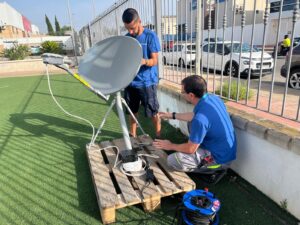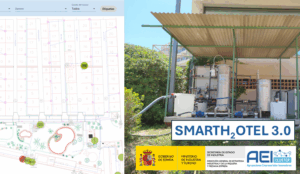“`html
Would you like to enjoy fresh vegetables grown by yourself in the comfort of your home? You don’t need a big garden! With an urban garden, you can grow your own vegetables even in small spaces like balconies or terraces. Want to know how? I’ll tell you how to do it!
Prepare your growing space
The first thing you need to do is prepare the space where you will place your urban garden. You can use pots, planters, wooden boxes, or even recycled containers like plastic bottles or cans. Make sure your containers have holes at the bottom for water drainage and place a layer of small stones or ceramic pieces at the bottom to prevent excess water from accumulating.

Then, choose a place where your urban garden can receive at least 6 hours of direct sunlight per day. This is essential for the healthy growth of your vegetables. If you don’t have outdoor space, you can choose to grow indoors near a sunny window or using grow lights.
Select the right vegetables
Choose vegetables that adapt well to container gardening and do not require too much space to grow. Some ideal options for growing in urban gardens include lettuce, cherry tomatoes, carrots, radishes, peppers, herbs, and spinach. Also, consider the possibility of growing compact varieties or miniatures of your favorite vegetables, which are perfect for small spaces.
It is important to consider the climate and season when selecting vegetables for your urban garden. Some vegetables, like tomatoes and peppers, require warm temperatures to grow properly, while others, like spinach and carrots, prefer cooler climates. Research the specific needs of each vegetable and choose those that are most suitable for your location and season.
Care for your garden regularly
Once you have planted your vegetables in your urban garden, it is important to care for them regularly to ensure proper growth and development. This includes watering your plants regularly, making sure the soil is always moist but not waterlogged. Also, fertilize your vegetables every two weeks with an organic fertilizer to promote healthy growth and abundant production.
In addition to watering and fertilizing, you should be on the lookout for possible pests or diseases that may affect your plants. Regularly inspect your vegetables for signs of pests, such as damaged or bitten leaves, and take preventive measures, such as using natural insecticides or manually removing pests. Also, make sure to prune your plants regularly to promote vigorous growth and prevent them from becoming too bulky.

Control space and irrigation
In an urban garden, space is limited, so it is important to optimize it to the maximum. Use techniques like vertical gardening or planting in narrow rows to make the most of the available space. Also, consider using stackable pots or hanging planters to maximize growing space in small balconies or terraces.
Irrigation is another crucial aspect in caring for your urban garden. It is important to water your plants regularly to keep the soil moist, especially during the warmer months of the year. However, avoid overwatering, as it can lead to root rot and other diseases in your plants. Use a drip irrigation system or a watering can with an adjustable nozzle to ensure your plants receive the right amount of water.
Enjoy your fresh, homemade vegetables
Once your vegetables are ready to harvest, the most exciting moment arrives: enjoying your own fresh and homemade crops. Harvest your vegetables when they are at their optimal maturity, which is usually indicated on the plant tag or planting instructions. Then, enjoy them in delicious salads, stir-fries, soups, or simply as a side dish to your favorite meals.
Growing your own urban garden allows you to connect with nature, reduce your ecological footprint, and promote a healthier and more sustainable lifestyle. The process of growing your own vegetables can be therapeutic and rewarding, helping you reduce stress and increase your overall well-being.
“`
via: MiMub in Spanish









